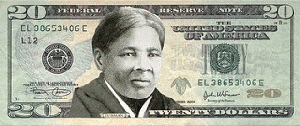Yesterday, Treasury Secretary Jack Lew announced that by 2030, president Andrew Jackson would be replaced by slave-freer Harriette Tubman.
Here is Bill Still's 19-minute take on it:
The similarities between the power and corruption of the 2nd Bank of
the U.S. (B.U.S.) and today's TBTF banks is profound, though the B.U.S. and its
president were a lot more direct and blatant about their hold on the
economy, trying and almost succeeding in sinking it into deflation.
Only a last-minute populist revolt saved the Republic and ended the B.U.S. by failing to renew its charter. The president of the B.U.S. Nicholas Biddle would later die while battling civil charges of fraud.
Jackson did dissolve the bank but couldn't quite replace it with a
working public bank to represent "we the people" and the period from
Jackson to Lincoln was more chaotic and inflationary than was healthy or
necessary, and Still doesn't quite acknowledge that enough, in my opinion. A
somewhat counter-veiling view of this period is provided by Steven Mihm's book "A Nation of
Counterfeiters." Despite the chaos and inefficiency of having hundreds of local banks and even local taverns produce the national money supply in the Jackson to Lincoln period, it's certainly true, as Still says, that there
was also great industrial progress in this period as well, at least in
the northeast. How much of that was due to Jackson's policies is
debatable, and Still's claim that the next 77 years of growth was
largely due to Jackson's routing of the then-Central Bank and the degree
to which banking power was returned to the states and local control
over-reaches.
Lincoln and his Greenbacks, issued by the Treasury, debt-free, and amounting to 40% of the government budget at its peak (read "The Lost Science of Money" by Stephen Zarlenga) had
at least as much to do with American growth, at least during the period
they were allowed to become a major part of the national money supply,
as Jackson's semi-successful effort at ridding the nation of
debt-creating Central Banks. Unfortunately, the role of the B.U.S. was
taken up by several powerful private banks, and the government's role in
producing the money supply was diminished by a bribed Congress and the
People's inability to establish a true Sovereign Money revolution, though they certainly tried, even to the point of creating a Greenback Party and running Greenbacker Peter Cooper for President in 1876. As
Still points out though, we have Alexander Hamilton to thank for both
the Constitutional and historical precedent of the nation borrowing what
it could create. The Constitution allows for either, but mostly the
former has been practiced, to our great national detriment, and, with the exception of Jackson's paying off the national debt in 1835, to our permanent national debt.
President Obama and Michelle saw Hamilton (and so have Sanders and his wife) on Broadway. And Obama's Treasury Secretary Jack Lew has now scrapped plans to remove Hamilton from the $10 bill and to remove Jackson from the $20 instead. This is a clandestine supplication to the banker elites disguised as bending to the populist will, or perhaps just the reality that replacing either of these men with the unarguably lesser figure of Harriette Tubman, is unpalatable to most Americans. However, the revolt against replacing Jackson, an avowed racist and genocider against the Indians (the Trail of Tears took place under Jackson), may be harder to pull off. Perhaps we need a Broadway musical "Jackson" that few can afford with an all-Indian cast? OK, that is too cynical, maybe, but new history is often produced by inattention to existing history.
Maybe it won't matter in the end, once the money power gets its way and gets rid of all cash anyway, pictures of dead presidents, Treasury Secretaries, and Underground Railroad conductors, and all, and makes us all permanent tithers to the banks, our true rulers today. It may even happen before 2030. You can take that to the bank.






